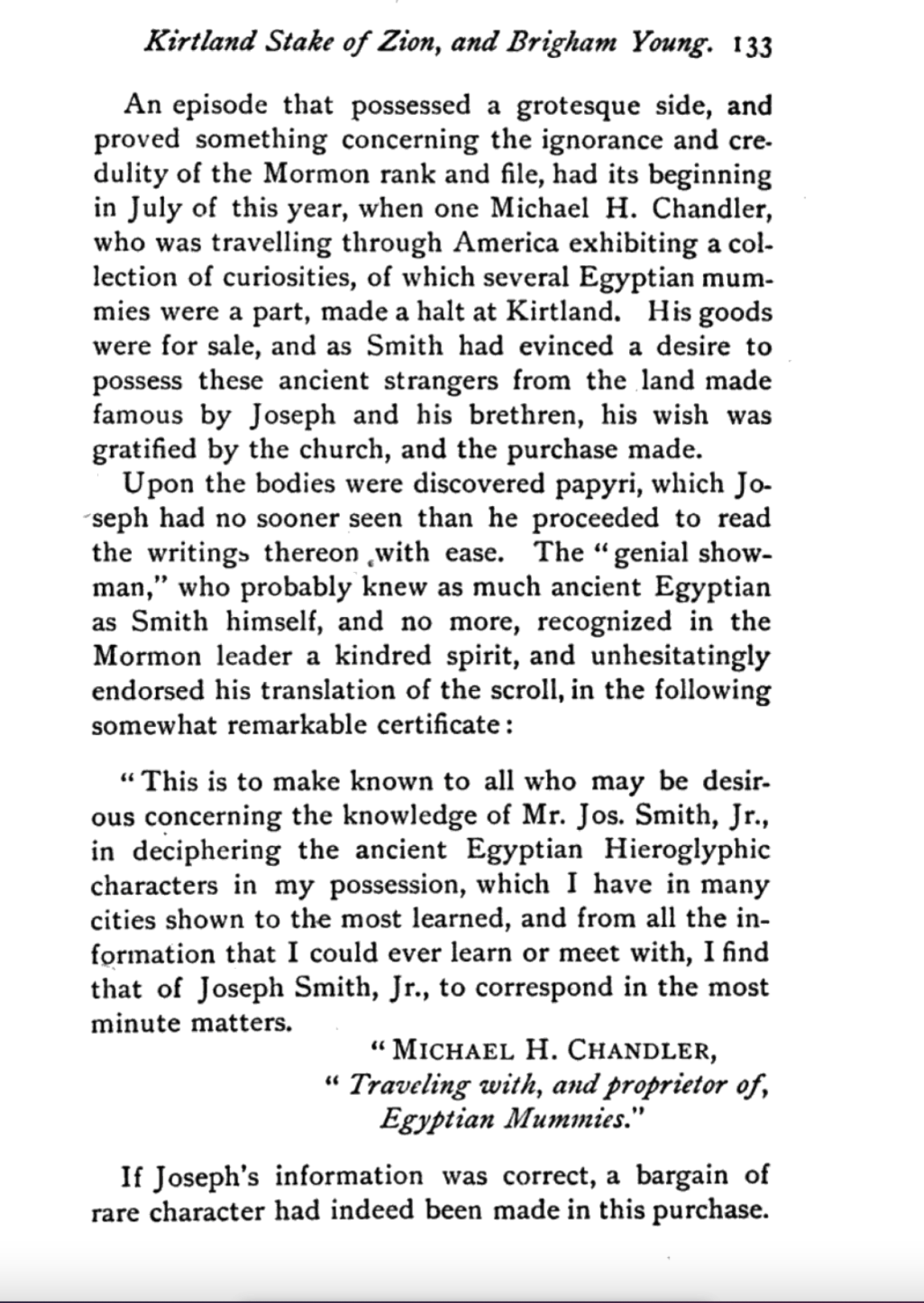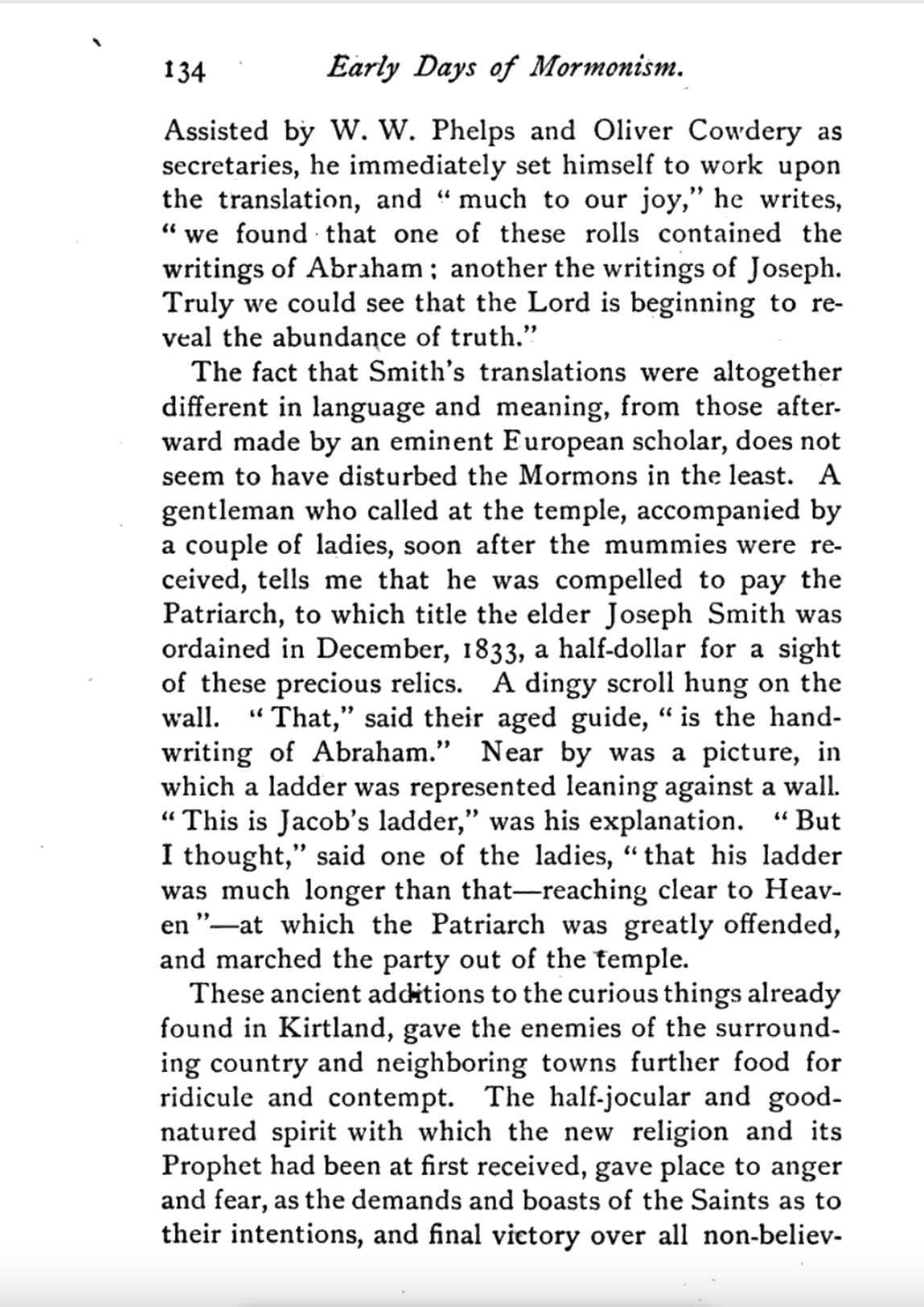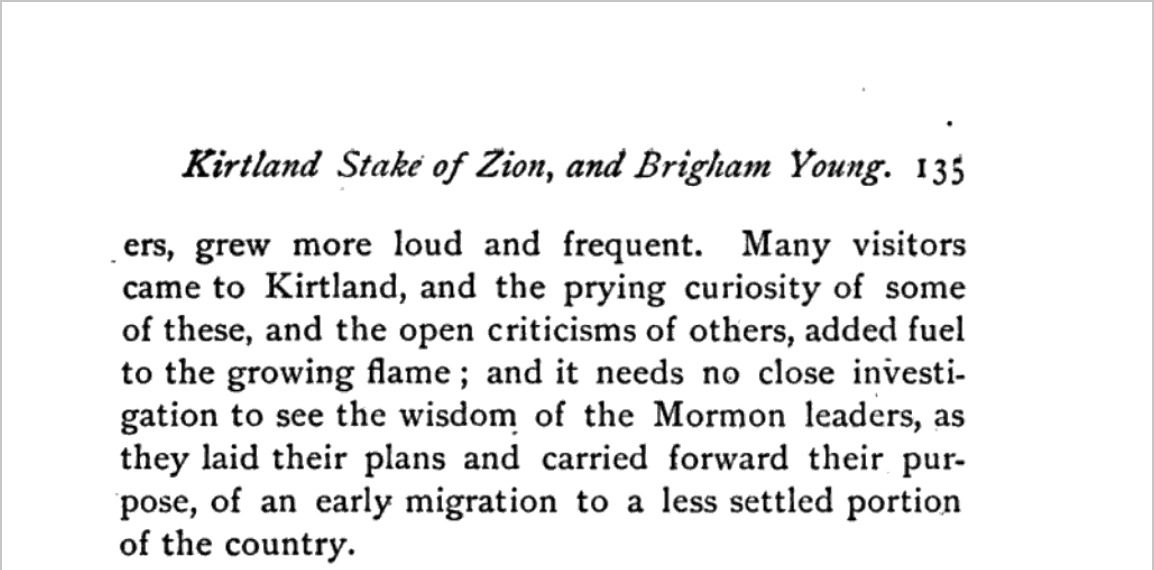J. H. Kennedy says that Joseph Jr. could translate the papyri as soon as he saw them.
- Type
- Book
- Source
- J. H. Kennedy CriticNon-LDS
- Hearsay
- UnsourcedLate
- Reference
J. H. Kennedy, Early Days of Mormonism: Palmyra, Kirtland, and Nauvoo (New York: Charles Scribner's Sons, 1888), 133–135
- Scribe/Publisher
- Charles Scribner
- People
- Michael H. Chandler, W. W. Phelps, Joseph Smith, Sr., Abraham, J. H. Kennedy, Joseph Smith, Jr., Oliver Cowdery
- Audience
- Reading Public
- Transcription
An episode that possessed a grotesque side, and proved something concerning the ignorance and credulity of the Mormon rank and file, had its beginning in July of this year [1835], when one Michael H. Chandler, who was travelling through America exhibiting a collection of curiosities, of which several Egyptian mummies were a part, made a halt at Kirtland. His goods were for sale, and as Smith had evinced a desire to possess these ancient strangers from the land made famous by Joseph and his brethren, his wish was gratified by the church, and the purchase made.
Upon the bodies were discovered papyri, which Joseph had no sooner seen than he proceeded to read the writings thereon with ease. The "genial showman," who probably knew as much ancient Egyptian as Smith himself, and no more, recognized in the Mormon leader a kindred spirit, and unhesitatingly endorsed his translation of the scroll, in the following somewhat remarkable certificate:
"This is to make known to all who may be desirous concerning the knowledge of Mr. Jos. Smith, Jr., in deciphering the ancient Egyptian Hieroglyphic characters in my possession, which I have in many cities shown to the most learned, and from all the information that I could ever learn or meet with, I find that of Joseph Smith, Jr., to correspond in the most minute matters,
"MICHAEL H. CHANDLER,
"Traveling with, and proprietor of Egyptian Mummies."
If Joseph's information was correct, a bargain of rare character had indeed been made in this purchase.
Assisted by W. W. Phelps and Oliver Cowdery as secretaries, he immediately set himself to work upon the translation, and "much to our joy," he writes, "we found that one of these rolls contained the writings of Abraham; another the writings of Joseph. Truly we could see that the Lord is beginning to reveal the abundance of truth."
The fact that Smith's translations were altogether different in language and meaning, from those afterward made by an eminent European scholar, does not seem to have disturbed the Mormons in the least. A gentleman who called at the temple, accompanied by a couple of ladies, soon after the mummies were received, tells me that be was compelled to pay the Patriarch, to which title the elder Joseph Smith was ordained in December, 1833, a half-dollar for a sight of these precious relics. A dingy scroll hung on the wall. "That," said their aged guide, "is the hand-writing of Abraham." Near by was a picture, in which a ladder was represented leaning against a wall. "This is Jacob's ladder," was his explanation. "But I thought," said one of the ladies, "that his ladder was much longer than that—reaching clear to Heaven"—at which the Patriarch was greatly offended, and marched the party out of the temple.
These ancient additions to the curious things already found in Kirtland, gave the enemies of the surrounding country and neighboring towns further food for ridicule and contempt. The half-ocular and good-natured spirit with which the new religion and its Prophet had been at first received, gave place to anger and fear, as the demands and boasts of the Saints as to their intentions, and final victory over all non-believers, grew more loud and frequent. Many visitors came to Kirtand, and the prying curiosity of some of these, and the open criticisms of others, added fuel to the growing flame; and it needs no close investigation to see the wisdom of the Mormon leaders, as they laid their plans and carried forward their purpose, of an early migration to a less settled portion of the country.
- Source Link
- https://www.google.com/books/edition/Early_Days_of_Mormonism/jWIwAQAAMAAJ?hl=en&gbpv=1&dq=
- Citations in Mormonr Qnas
The B. H. Roberts Foundation is not owned by, operated by, or affiliated with the Church of Jesus Christ of Latter-day Saints.



